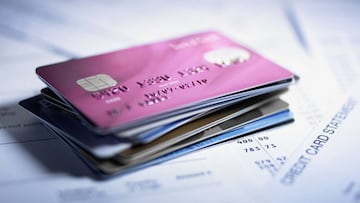What happens if you are late on a credit card payment?
When life gets hectic or your finances are strained you may miss a credit card payment. Don’t panic, there are ways to remedy the situation. Here’s how…

Credit cards can be a useful tool to cover expenses in a cash crunch or just to avoid carrying a lot of money on you when out and about. However, the bill for what you charge needs to be paid every month or you could risk a small purchase becoming much more expensive than you bargained for.
When life gets hectic or your finances are strained you may miss a credit card payment. Don’t panic but sit down to take a minute to figure out the path forward to avoid the situation getting worse than it has to be. There are some simple steps to take to remedy the situation and get your payments back on track without much further ado.
What to do if you miss a credit card payment
The first thing you want to do if when you check your balance and see a “past due” notice on your payment history is not to panic but you will want to take action right away. First and foremost, if you can, pay your balance in full. Should your finances be stretched thin, at least try to make the minimum payment right away.
The sooner you can get a payment to your creditor the less harm that will come from a late payment. This could include late charges, interest rate hikes and a lowering of your credit score.
You will also want to contact your credit card company. While you will most likely be charged a late fee for the missed payment, if you’re in good standing and it’s your first time, you may be able to sweet talk the customer service representative in to waiving it. Don’t hold your breath, but it never hurts to try.
What happens if you are late on a credit card payment?
Besides incurring extra unwanted costs through late fees and higher interest rates on your balance, your credit score is the most at risk if you don’t pay your bill on time. Fortunately, if you missed a payment but you can pay your balance before 30 days have passed, it won’t appear on your credit reports.
However, past that point, every additional 30 days that you fail to make a payment will further knock your credit score down. This is important because payment history makes up 35 percent of the FICO Score model, meaning late payments can drag yours down fast. Also, the higher your credit score the more you get penalized.
Should your financial institution give up on trying to get you to pay them back, they will turn over the job of recouping the debt to a collection agency. This would do even more harm to your credit score. Generally this happens after six months but there is no set rule and it is up to your credit card company as to when they would call in a debt collector.
Late fees for missed credit card payments
The simple fact of missing a payment will have two automatic consequences a late fee and increased interest rate. The former is generally between $20 and $40, but there are limits set by law.
Under the Credit Card Accountability Responsibility and Disclosure Act of 2009 (CARD Act) a first late payment fee cannot exceed $30 as of January 2022. However, if after that late payment you make another late payment within the next six billing cycles, your credit card company can charge you up to $41 for each subsequent late payment.
But a late fee cannot be more than the minimum payment due on the account. The cap on late fees is adjusted annually by the Consumer Financial Protection Bureau (CFPB).
Higher APR interest rates for missed credit card payments
Missing a credit card payment could see your interest rate jump as well. Your financial institution may apply a penalty APR as soon as you’ve missed that payment which would apply to future purchases. You may also lose any promotional interest rate program that you had with the issuer. In time that higher interest rate could be applied to the rest of your balance as well.
Again, you’ll want to talk to the customer service department of your issuer to see if you can get your interest rate put back to the lower rate. Making a payment as soon as possible will establish good will but there is no guarantee that they will right away. If they say no, try again after you’ve made on-time payments over a six-month period.






